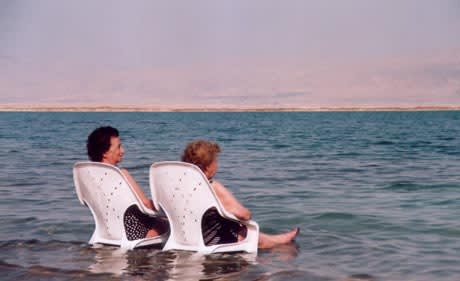Theres a lack of focus to this Israeli documentary that keeps it from getting top marks but its subject and material are so moving that youre likely to forget its schematic and aesthetic flaws.
The ostensible subject is a group of senior citizens who meet in the Mount Herzl cemetery, where various Israeli heroes and heads of state are buried. None of the group have family there but they collect there anyway to socialise, discuss philosophy, read poetry and argue. But the main focus of the film is two of its members: Minia and Lena, director Tali Shemeshs grandmother and great aunt. Theyre a pair who bicker and disagree over their past history together and the strength of their relationship, in between recounting their stories of life during the Holocaust.
Alas, the director cant pull together the argumentative strands in either the group or the directors antecedents, and the film doesnt so much prove a point or move towards a thesis as offer an amorphous vision of the past leaning on the present. But though the film is nebulous as a whole, theres no denying the moving nature of most of the parts. A reminiscence of first love in the Warsaw Ghetto will take your breath away, as does an admission that theres nothing new about Lena's reaction to Auschwitz because everyone says the same things.
You have to pick through the loose ends and dead air sometimes but there are such good nuggets of remembrance and discussion that you forgive it its tentative structure and just learn what you can from these women, the other members and the link to history that they represent.
(Mongrel Media)The ostensible subject is a group of senior citizens who meet in the Mount Herzl cemetery, where various Israeli heroes and heads of state are buried. None of the group have family there but they collect there anyway to socialise, discuss philosophy, read poetry and argue. But the main focus of the film is two of its members: Minia and Lena, director Tali Shemeshs grandmother and great aunt. Theyre a pair who bicker and disagree over their past history together and the strength of their relationship, in between recounting their stories of life during the Holocaust.
Alas, the director cant pull together the argumentative strands in either the group or the directors antecedents, and the film doesnt so much prove a point or move towards a thesis as offer an amorphous vision of the past leaning on the present. But though the film is nebulous as a whole, theres no denying the moving nature of most of the parts. A reminiscence of first love in the Warsaw Ghetto will take your breath away, as does an admission that theres nothing new about Lena's reaction to Auschwitz because everyone says the same things.
You have to pick through the loose ends and dead air sometimes but there are such good nuggets of remembrance and discussion that you forgive it its tentative structure and just learn what you can from these women, the other members and the link to history that they represent.
